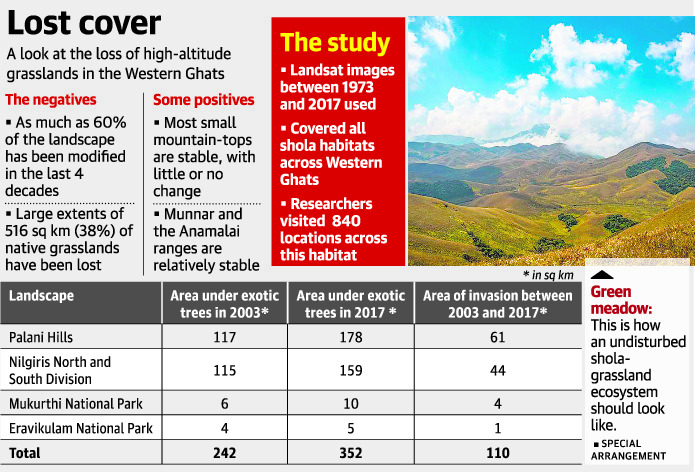Exotic Trees Eating up Western Ghat’s Grasslands
As per the study published recently in the international journal Biological Conservation, the Western Ghats have lost almost one-fourth of high-altitude grasslands over four decades, primarily due to exotic invasive trees, such as pine, acacia, and eucalyptus.
- Invasive Alien Species
- Invasive alien plant species are non-native species that spread and interfere in a new ecosystem by posing a serious threat to the native biodiversity, leading to economic loss. Invasive species don’t allow local species to grow and wildlife to move through.
Major Findings
- The satellite images reveal that 60% of the shola-grassland landscape has changed; almost 40% (516 km2) of native high-elevation grasslands have disappeared.
- Even though no plantations were established between 2003 and 2017, invasion by existing trees increased areas under exotic plantations(acacia, pine, and eucalyptus) by 27% in the Palanis and 17% in the Nilgiris.
- Satellite images show how shola-grasslands across the Ghats – from the Baba Budan Hills in Karnataka to Tamil Nadu's Ashambu Hills – changed in extent between 1972 and 2017. Broadly, shola-grassland ecosystems in Tamil Nadu showed the highest rates of invasion.
- Most of this loss occurred on the mountain tops of the Nilgiri, Palani and Annamalai hill ranges, which comprise more than half of the Ghat’s shola-grassland ecosystems, primarily due to the expansion of exotic trees (pine, acacia, and eucalyptus).
- However, shola forests have remained “relatively unchanged” over these years. The Annamalai-Munnar areas have also remained stable during this time.
International Convention on Invasive Species
- Convention on Biological Diversity (CBD) was adopted in 1992 and came into force in 1993. It aims to prevent the introduction of, control or eradicate those alien species which threaten ecosystems, habitats or species.
Shola Forests
- The Sholas are a mosaic of montane evergreen forests and grasslands. They are found only in high altitude (>1500 meters) regions within the tropics and are limited to the southern part of the western ghats.
- They are characterized by undulating grassland patches, interspersed with thickets of stunted evergreen tree species, and are home to a host of endemic and endangered plants and animals. They are also vitally important in keeping water cycles alive.
Way Forward
- All possible efforts must be made to conserve the remaining grassland tracts, as per scientists at IISER Tirupati, as very little research is focussed on grasslands and mechanisms to restore them are also few, unlike forests.
- The immediate reaction would be to remove all exotics including mature plantations from grasslands but that should not be done, as this would disrupt the ecosystem abruptly.
